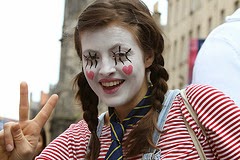One of my theatre professors in college talked a lot about how going out for coffee after seeing a show to discuss what you had just seen was an essential part of the experience. The audience is, after all, a part of the story, just as much as the actors on stage are, but are unique in the sense that they didn’t really know what to expect at all (it’s always in flux, but the actors have at least some idea). Talking after a show is really about de-briefing as much as anything else.
Part of the beauty of a theatrical performance is that it never really ends up the same way twice. That inconsistency is a beautiful thing, and a provocative thing. A huge part of the reason that it’s never the same performance two nights in a row is that the audience is completely different, and their reactions alter the performances of the actors on stage. Theatre isn’t so much a performing art as it is an interactive art, which is why it has become a lens for understanding communities, minorities, oppressed people groups, and theologies.
The understanding of interactivity, though, often stops with the question, what did the audience take away? The story being performed, after all, is ultimately being performed for the audience.
I’ve been involved in a lot of performances in a lot of different venues. I’ve done shows in huge auditoriums with state-of-the-art lighting equipment and elaborate sets, and I’ve done it on the street for community outreach projects with no sets or even costumes. What’s consistent is that the audience is always impacted.
What’s also consistent, though, is that the cast and crew are just as deeply impacted. And it’s not always through the performance.
I’ve learned a great deal about myself through the performances with which I’ve been involved. I’ve learned a great deal about others. I’ve learned a great deal about my faith. Theatre, in it’s capacity as a performing art, is a uniquely collaborative art. Many artists from different disciplines come together to form a production. Especially when you’ve been involved in several productions with the same group of people, you find that you’ve had a “foxhole” experience of sorts.
So, the experience for the audience is a huge part of theatre. Audience members going for coffee and discussing the show is a huge part of realizing what new things you know and appreciate about what it is to be human after a show. The cast and crew going for drinks after the curtain call is much the same. Theatre, being uniquely collaborative, is uniquely geared to delve into the experience of being human. So, whether you’re in the show or seeing the show, you’re having a deep experience with the person or people with whom you’re experiencing the show.
I just wish that the two sides…the actors and the audience…would connect and talk about what they’ve experienced more.
Have you seen a show lately? You should go do that…
Image credit: Alastair Barnsley under Creative Commons
